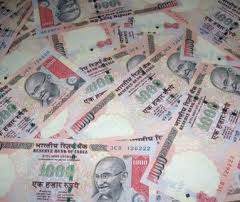
New Delhi, Jun 14: Switzerland today said the quantum of money held by Indians in Swiss banks stood at 2.18 billion Swiss francs (about Rs 12,740 crore) at the end of 2011 -- rising for the first time in the past five years.
The total funds held by Indian individuals and entities include 2.025 billion Swiss francs held directly by them and 158 million held through 'fiduciaries' or wealth managers, shows the latest data disclosed by the Swiss National Bank (SNB) in its annual handbook on Swiss banks published today.
The funds, described by SNB as 'liabilities' of Swiss banks towards their clients from India, are the official figures disclosed by the Swiss authorities and do not indicate towards the quantum of the much-debated alleged black money held by Indians in the safe havens of Switzerland.
Also, SNB's official figures do not include the money that Indians or other nationals might have in Swiss banks in the names of others. While there is no official estimate for such unaccounted funds, but some estimates put it as high as 20-25 billion dollars.
As per the data from SNB, Switzerland's central bank, the quantum of funds held by Indians in Swiss banks had last increased in 2006 by about one billion Swiss francs to 6.5 billion Swiss francs (over Rs 40,000 crore), but fell to less than one-third by the end of 2010. It rose by about Rs 3,500 crore in 2011.
In a White Paper on black money tabled in Parliament last month, the Indian government had also mentioned that the total liabilities of Swiss banks towards Indians have been coming down since 2006 and fell by more than Rs 14,000 crore during the 2006-2010 period.
The liabilities stood at Rs 9,295 crore at the end of 2010, compared to Rs 23,373 crore in 2006.
Amid allegations of Indians stashing huge amounts of illicit wealth abroad, including in Swiss banks, the government says it is making various efforts to bring back the unaccounted money.
The White Paper said that "Switzerland has agreed to share information prospectively only and has accepted limited retrospectively only in case of some countries, such as India."
As per SNB data, funds held by Indians directly in the Swiss banks increased by about 370 million Swiss francs to 2.025 billion Swiss francs (Rs 11,800 crore) in 2011. On the other hand, the funds held through 'fiduciaries' nearly halved to 158 million Swiss francs (about Rs 900 crore) in 2011 -- marking the fifth straight year of decline.
Fiduciaries are essentially wealth fund managers who hold the money of Indian private holders and families in the so-called numbered accounts. The Swiss banks' direct liabilities towards clients from India include funds held in savings and deposit accounts by Indian individuals, financial institutions and corporates.
In terms of liabilities through fiduciary accounts, the UK tops the list with 6.1 billion Swiss francs, followed by Saudi Arabia's 5.95 billion Swiss francs, while Pakistan is also placed higher than India with 355 million Swiss francs.
On the other hand, the size of Swiss banks' assets in India also increased about about two billion Swiss francs to 6.4 billion Swiss francs (over Rs 37,000 crore) in 2011. Their assets have been continuously increasing since 2006 and has more than doubled in this period.
The experts have been saying that there has been a "perceptible flight of funds" of Indian holders from Swiss banks to other places in the recent years. The foreign capital-friendly regulations in places like Mauritius and Dubai were possibly being exploited by those seeking to move their funds away from Swiss banks, which have come under strict scrutiny of late.
At the same time, the global pressure has been rising on Switzerland to ask its banks to share information about their clients with foreign governments. It is being suspected now that Indians having illicit wealth in Swiss banks may be moving their funds in fear of being exposed due to growing scrutiny. At the same time, even those having legitimate funds in Swiss banks may be moving away, due to a growing level of negativity attached to them.
Top financial regulators Sebi and RBI have already stepped up their vigil over Indian entities routing their funds from secretly held Swiss bank accounts to India through other locations.
It is feared that the money might be routed back to India, either into the stock market through FIIs or even via the FDI route.




Comments
Add new comment